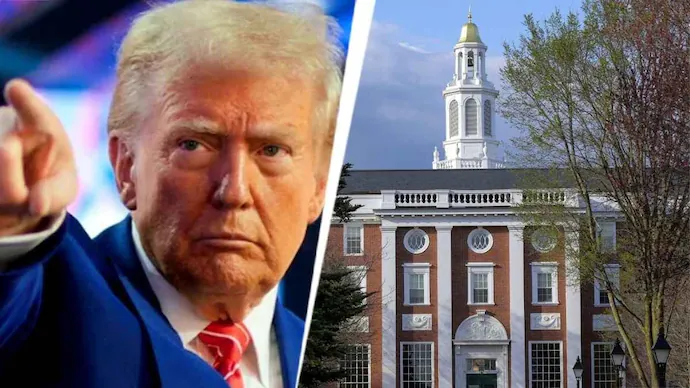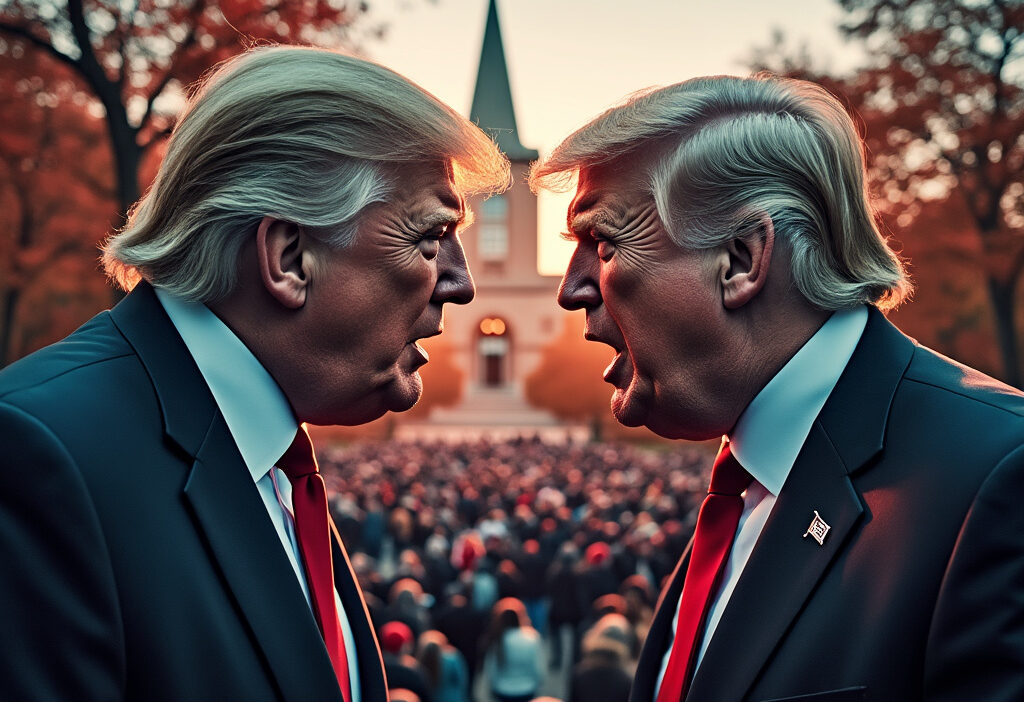Trump Administration’s Feud with Harvard University Over International Students
The Trump administration’s decision to revoke Harvard University’s ability to enroll international students marks a significant escalation in their ongoing conflict. This article explores the background, demands, and responses from both sides, shedding light on the broader implications for higher education and international students in the U.S.
The Revocation Announcement
On May 23, 2025, the Trump administration delivered a seismic blow to Harvard University by revoking its authority to enroll international students. The Department of Homeland Security cited “repeated non-compliance with federal oversight requirements” and alleged that Harvard had “failed to adequately vet foreign students for potential national security risks.” The move was framed as part of a broader crackdown on institutions resisting stricter immigration controls.
Harvard President Lawrence Bacow condemned the decision as “politically motivated and devoid of merit,” while faculty and student groups organized protests within hours. The Association of American Universities (AAU) called it “an assault on academic freedom,” warning of ripple effects across higher education. International students, particularly those from China and the Middle East, faced immediate uncertainty, with some fearing deportation.
Legal experts questioned the administration’s authority to single out Harvard, suggesting the move could face swift judicial challenges. Meanwhile, the White House doubled down, with a spokesperson stating, “No institution is above accountability.” The revocation marked a dramatic escalation in a feud that had simmered since April, setting the stage for a protracted legal and ideological battle.
Background of the Conflict
The feud between the Trump administration and Harvard University began in April 2025 when the White House issued a series of demands targeting the university’s policies. Central to the conflict was the administration’s insistence that Harvard address alleged antisemitism on campus, dismantle diversity, equity, and inclusion (DEI) programs, and provide detailed reports on international students. Harvard’s leadership, led by President Claudine Gay, refused, arguing the demands infringed on academic freedom and institutional autonomy. This defiance set the stage for the administration’s May 23 revocation of Harvard’s ability to enroll international students—a move framed as a response to noncompliance. The dispute reflects broader tensions over federal oversight of higher education and the politicization of campus policies.
The White House’s Demands
The Trump administration’s demands to Harvard were multifaceted, targeting contentious issues in higher education. First, it insisted on reforms to combat antisemitism, citing alleged discrimination against Jewish students and faculty. The White House demanded transparency in disciplinary actions and curriculum reviews to address perceived biases. Second, it called for the termination of Diversity, Equity, and Inclusion (DEI) initiatives, arguing they fostered division rather than unity. This included dismantling affirmative action policies and bias reporting systems. Third, the administration required detailed reporting on international students, including visas, funding sources, and academic activities—a move critics saw as an extension of broader immigration scrutiny. These demands were framed as accountability measures but were widely interpreted as politically motivated, escalating tensions between federal oversight and institutional autonomy.
Harvard’s Partial Compliance
Harvard’s response to the Trump administration’s demands was a mix of partial compliance and defiance. While the university agreed to submit limited data on international students—such as enrollment numbers and visa statuses—it refused to disclose sensitive personal details, citing privacy concerns and academic freedom. Harvard maintained that broader reporting requirements could create a chilling effect on its global student body.
The university also pushed back against calls to dismantle DEI initiatives, arguing they were essential to fostering an inclusive campus. However, it did introduce additional measures to address antisemitism, including enhanced reporting mechanisms and bias training, though critics argued these steps were insufficient. Harvard’s stance reflected a balancing act: appeasing federal scrutiny while protecting institutional autonomy.
This cautious approach drew criticism from both sides—conservatives accused Harvard of stonewalling, while progressives feared any concession would embolden further demands. The tension set the stage for the administration’s retaliatory actions, as explored in the next chapter.
Administration’s Punitive Measures
The Trump administration retaliated against Harvard’s partial compliance by launching punitive measures aimed at pressuring the university. Funding freezes were imposed on federal research grants, directly targeting Harvard’s financial backbone. Simultaneously, the administration threatened to revoke the university’s tax-exempt status, a move that would cripple its endowment and operational flexibility. These actions were framed as enforcement of immigration laws but were widely seen as political retaliation for Harvard’s resistance. The escalation signaled a hardline stance, setting a precedent for future clashes with academia.
The Broader Campaign Against Universities
The Trump administration’s clash with Harvard was not an isolated incident but part of a broader campaign targeting universities perceived as liberal strongholds. Federal investigations into foreign funding, particularly from China, were weaponized to pressure institutions like Harvard, Yale, and MIT, with the Department of Education accusing them of failing to disclose foreign gifts. Simultaneously, the DOJ scrutinized elite universities over alleged antitrust violations in financial aid practices, signaling a coordinated effort to undermine their autonomy.
Key tactics included:
- Leveraging visa restrictions to curb international student enrollment, directly impacting revenue streams.
- Threatening tax-exempt status over perceived political biases, chilling academic freedom.
- Promoting “patriotic education” as a counter to curricula deemed anti-American, further polarizing academia.
This pattern reflected a larger ideological battle, framing universities as adversaries in a culture war. The Harvard feud exemplified how policy was wielded to punish dissent, with ripple effects across higher education. The next chapter explores how these actions destabilized international student communities.
Impact on International Students
The Trump administration’s feud with Harvard over international students had immediate and far-reaching consequences. The revocation of visas for students attending online-only programs left thousands in limbo, forcing many to choose between abrupt relocation or deportation. Harvard’s international cohort—representing over 150 countries—faced heightened uncertainty, with some unable to return home due to travel restrictions or political instability.
Key impacts included:
- Disrupted academic progress: Research projects and lab work stalled, particularly in STEM fields reliant on campus resources.
- Financial strain: Sudden travel and housing costs burdened students, especially those from lower-income nations.
- Chilling effect on applications: Prospective students questioned the stability of U.S. education, with some opting for Canada or Europe instead.
The policy also exposed systemic vulnerabilities in immigration frameworks tied to enrollment. While Harvard leveraged its endowment to support affected students, smaller institutions lacked such resources, exacerbating inequities. The fallout reinforced perceptions of the U.S. as an unwelcoming destination for global talent, with long-term repercussions for innovation and cross-cultural exchange.
Harvard’s Financial and Academic Standing
The Trump administration’s feud with Harvard over international students has raised concerns about the university’s financial and academic stability. Harvard’s $41.9 billion endowment, the largest among U.S. universities, relies partly on international student tuition and global partnerships. Restrictions on visas and enrollment could strain revenue streams, affecting funding for research, scholarships, and faculty recruitment.
Academically, Harvard’s reputation as a global leader hinges on its diverse student body and cross-border collaborations. Policies limiting international scholars may weaken its research output, particularly in STEM fields where foreign talent is critical. Additionally, the uncertainty may deter future partnerships, eroding Harvard’s competitive edge against peer institutions like Oxford and MIT.
The conflict also risks politicizing Harvard’s brand, potentially alienating donors and applicants. While its prestige offers some insulation, prolonged disputes could accelerate shifts in global education trends, favoring universities in more welcoming countries. The long-term implications extend beyond finances—Harvard’s role as an intellectual hub may diminish if the U.S. continues tightening immigration policies.
This tension underscores how political battles can destabilize even elite institutions, reshaping higher education’s future landscape. The next chapter examines the legal and ethical dimensions of these policies.
Legal and Ethical Considerations
The Trump administration’s feud with Harvard over international students was framed as a legal enforcement of immigration policy, citing the need to curb alleged abuses of student visas. The Department of Homeland Security (DHS) relied on 8 U.S. Code § 1184, which grants broad authority to regulate nonimmigrant admissions. However, critics argued the move was politically motivated, targeting elite institutions as part of a broader anti-immigration agenda.
Ethically, the policy raised concerns about:
- Discrimination: By focusing on international students, the administration risked alienating a key demographic contributing to academic and economic growth.
- Academic freedom: Universities argued that federal overreach threatened institutional autonomy in admissions and curriculum decisions.
- Due process: Sudden policy shifts, like the 2020 ICE directive mandating in-person classes during COVID-19, left students without adequate recourse.
Legal challenges, including Harvard’s lawsuit, highlighted the administration’s inconsistent application of statutes, with courts often siding with universities on procedural grounds. The conflict underscored tensions between federal authority and higher education’s traditional independence.
Future Implications for Higher Education
The feud between the Trump administration and Harvard over international students could reshape U.S. higher education for years. Policy shifts may deter global talent, weakening America’s competitive edge in research and innovation. Universities might face increased federal scrutiny, eroding their autonomy in admissions and curriculum decisions.
Potential long-term effects include:
- Declining international enrollment, reducing cultural diversity and tuition revenue critical for funding.
- Stricter visa policies, pushing students toward Canada, Australia, or Europe.
- Legal precedents that expand government influence over academic institutions.
If universities resist, they could face funding cuts or political retaliation, further polarizing education. Alternatively, schools may adapt by forging stronger global partnerships or lobbying for legislative protections. The conflict underscores a broader debate: balancing national security with academic freedom in an interconnected world.

Conclusions
The Trump administration’s feud with Harvard University over international students underscores a pivotal moment in U.S. higher education. This conflict not only highlights the tensions between government oversight and academic independence but also raises critical questions about the future of international education in America.



